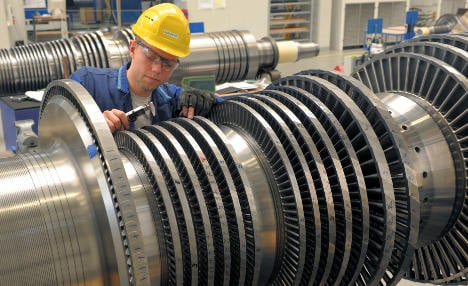Russian President Dmitry Medvedev and German Chancellor Angela Merkel oversaw the agreement as they vowed to cement tight Moscow-Berlin links further.
Siemens also agreed to help the Kremlin in its efforts to establish a technology centre in Skolkovo just outside Moscow – the country’s answer to Silicon Valley – for which the government has earmarked 170 billion rubles ($5.5 billion).
“These truly are serious, big agreements,” Medvedev told reporters after the talks with Merkel – their fifth meeting this year – in the Urals city of Yekaterinburg. “This is the evidence of a fundamental character of our strategic partnership.”
Under a memorandum of understanding Siemens will modernise 22 Russian railway switching yards by 2026 and jointly with Russian Railways build 240 regional trains over the next ten years. Siemens is also to install wind turbines with a total capacity of up to 1,250 megawatts in Russia by 2015, the company said in a statement.
The deals have a total value of “several billion euros”, Siemens said, without giving further financial details.
German government sources have reportedly said the railway deal alone is worth €2.2 billion ($2.8 billion).
The German firm also inked a deal with state conglomerate Russian Technologies and utility company RusHydro.
Russia’s VEB development bank and Germany’s KfW bank group for their part signed an agreement to support small and medium-sized businesses.
Medvedev invited German businesspeople to invest in companies which had until recently been off limits to foreigners.
“I expect that German companies will take part in the modernisation of companies they are interested in, also taking into account my decision to reduce the number of strategic enterprises,” Medvedev said.
Last month, Medvedev announced he was cutting fivefold the number of firms deemed “strategic” and in which the state is obliged to own a stake, opening the way for broader participation of foreign companies in the economy.
He also expressed hope that Russia’s “strategic partnership” with Germany would help Russian companies expand their footprint in the Western European market.
While German investment in Russia amounted to around $20 billion, Russian investment in Germany lagged behind.
“There is a certain disproportion indeed,” Medvedev said. “Of course we would like to be more actively represented in the German economy. We have both a desire and money for it,” he added.
Calling Medvedev “dear Dmitry,” Merkel for her part said Russia and Germany had achieved “a high level of understanding.”
“I believe that the aim to diversify Russia’s economy, put it on a broader footing also meets the needs of our cooperation,” Merkel said, noting that 6,000 German companies were now active in Russia.



 Please whitelist us to continue reading.
Please whitelist us to continue reading.
Member comments